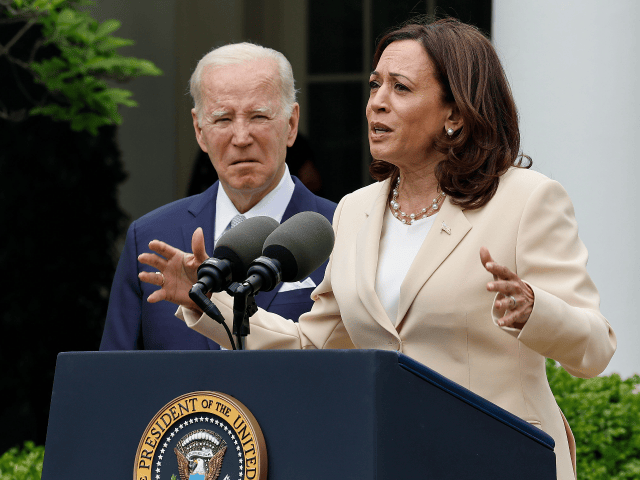Pollak: Biden, Harris Send Dangerously Mixed Messages on Israel
 Chip Somodevilla/Getty Images
Chip Somodevilla/Getty Images
President Joe Biden and Vice President Kamala Harris have been sending mixed messages on their support for Israel in recent days, reflecting competing priorities within the administration, and boosting the confidence of Hamas terrorists.
On Friday, Harris said Israel had the right to defend itself, while also suggesting the Biden administration is opposed to the Israeli government — a sentiment Biden echoed on Saturday, saying Prime Minister Benjamin Netanyahu was “hurting Israel.”
Biden also said that Israel should not attack the last Hamas battalions in Rafah, calling it a “red line.” At the same time, he said that he would not punish Israel for doing so by cutting off the weapons it needs for self-defense.
Effectively, Biden is saying that winning the war is a “red line” that he will not allow Israel to cross. But he has refused to say what the consequences would be.
Instead, he has emphasized the need for humanitarian aid to reach Palestinians — as if Israel were not allowing hundreds of trucks to enter Gaza every day.
Biden now wants to build a port in Gaza to help with aid imports, but has promised no “boots on the ground,” meaning the U.S. will have to rely on Israel for help.
So instead of using American leverage over Israeli policy, Biden is actually making U.S. forces dependent on help from Israel, reducing American leverage. He is criticizing Israel, while tying his administration more closely to the war effort.
These contradictory messages are the result of political pressure within the White House and the Democratic Party.
Anti-Israel staff have staged protests against Biden's support for Israel's war against the Hamas terrorists that attacked it, without provocation, on October 7. And in key swing states like Michigan, Arab- and Muslim-American voters have signaled that they will not support Biden's campaign for reelection unless he imposes a ceasefire and abandons Israel.
Rather than staring down these pressures and defending the U.S. interest in stopping radical Islamic terrorism, Biden and Harris are trying to have it both ways — sending arms to Israel, while at the same time criticizing its government.
As a result, they are hurting Israel's war effort, without convincing disgruntled anti-Israel voters to change their minds.
The contradiction is also starting to damage the war effort.
The longer that Biden forces Israel to delay the attack on Rafah, which could end the war, the longer the humanitarian crisis in Gaza continues, hurting Palestinians and increasing pressure on Israel. That pressure, in turn, convinces Hamas to keep fighting, rather than agreeing to a deal that would trade Israeli hostages for Palestinian terrorists and a six-week truce that could save Palestinian lives.
The Hamas leader in Gaza, Yahya Sinwar, reportedly believes that Palestinian suffering will eventually cause the White House to pull the plug on arms sales to Israel, ending the war and allowing Hamas to survive and to remain in power.
That is apparently why Hamas has hardened its demands in the negotiations, saying that it will not free the 134 Israeli hostages it still holds until Israel ends the war and leaves Gaza. Hamas has also called for more violence during the holy month of Ramadan, hoping to inflame opinion in the Islamic world.
Biden and Harris, by sending mixed messages, are encouraging Hamas to believe it is winning.
It would be simpler, and more effective, to support Israel and to allow it to win the war. The temporary cost of an Israeli attack on Rafah would arguably be worth the benefit of ending the war in weeks, not months, allowing aid to reach Palestinian civilians without fear that Hamas will steal it for its own purposes.
It would also be good for U.S. interests to see Hamas defeated, sending a message to would-be terrorists worldwide.
It is possible that Biden and Harris simply do not understand the stakes.
Biden said that Israel should find ways other than war to deal with the “trauma” of the October 7 terror attacks, as if Israel could solve the problem of terror through grief counseling.
His advice recalls the appalling display by then-Secretary of State John Kerry in 2015, who invited folk-rock singer James Taylor to serenade a French audience as a way of responding to an Islamic terror attack in 2015.
Israelis cannot afford such sentiments. They have decided that Hamas can no longer be allowed to threaten them.
Biden and Harris once appeared to agree. But perhaps they are not prepared to bear the political cost that victory may require.
Joel B. Pollak is Senior Editor-at-Large at Breitbart News and the host of Breitbart News Sunday on Sirius XM Patriot on Sunday evenings from 7 p.m. to 10 p.m. ET (4 p.m. to 7 p.m. PT). He is the author of the recent book, “The Zionist Conspiracy (and how to join it),” now available on Audible. He is also the author of the e-book, Neither Free nor Fair: The 2020 U.S. Presidential Election. He is a winner of the 2018 Robert Novak Journalism Alumni Fellowship. Follow him on Twitter at @joelpollak.
Source link

